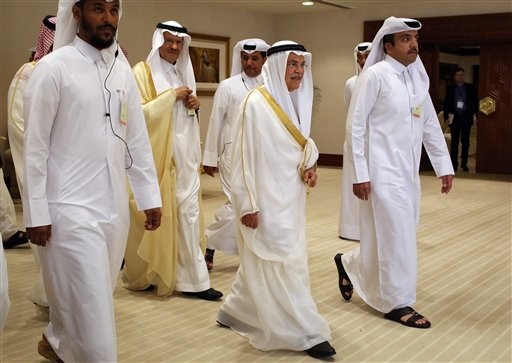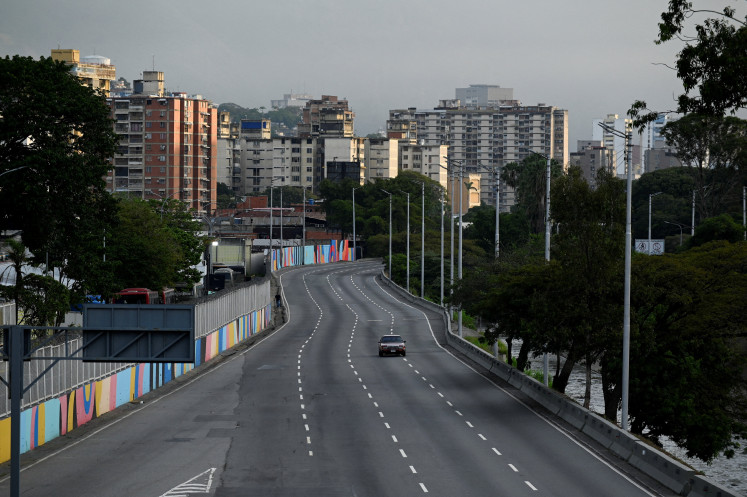Popular Reads
Top Results
Can't find what you're looking for?
View all search resultsPopular Reads
Top Results
Can't find what you're looking for?
View all search resultsQatar meeting over oil production drags as Iran absent
Change text size
Gift Premium Articles
to Anyone
 Oil meeting --Saudi Oil Minister Ali al-Naimi, center right, arrives at an oil-producers' meeting in Doha, Qatar, on Sunday. Oil-producing countries are meeting in Qatar to discuss a possible freeze of production to counter low global prices, but Iran's last-minute decision to stay home could dilute the impact of any agreement. (AP/Jon Gambrell)
Oil meeting --Saudi Oil Minister Ali al-Naimi, center right, arrives at an oil-producers' meeting in Doha, Qatar, on Sunday. Oil-producing countries are meeting in Qatar to discuss a possible freeze of production to counter low global prices, but Iran's last-minute decision to stay home could dilute the impact of any agreement. (AP/Jon Gambrell)
O
il-producing countries met Sunday in Qatar to discuss a possible freeze of production to counter low global prices, but Iran's decision to stay home and hours of negotiations without an announced decision raised questions about the impact of any possible agreement.
The attendees, including Saudi Oil Minister Ali al-Naimi, silently swept past gathered journalists at a luxury hotel in Doha. Also on hand was Russia, another of the world's top oil producers. The US, now a major producer because of shale oil, did not attend.
At least 15 oil-producing nations representing about 73 percent of world output were expected at the Doha meeting, Qatar's energy and industry minister, Mohammed bin Saleh al-Sada, has said.
The gathering follows a surprise Doha meeting in February between Qatar, Russia, Saudi Arabia and Venezuela, in which they pledged to cap their crude output at January levels if other producers do the same.
They hope the cap will help global oil prices rebound from their dramatic fall since the summer of 2014, when prices were above $100 a barrel, though no one is talking seriously about the more dramatic step of cutting production.
Prices dropped briefly to under $30 a barrel, a 12-year low, in January, but have climbed to the mid-$40s this week, boosted in part by market speculation about the Qatar meeting.
Western markets were closed Sunday and not immediately affected by the discussions, though the late-hour of the discussions likely will come into play Monday. Stock exchanges in Saudi Arabia and Dubai closed in negative territory Sunday, with the Saudi Tadawul down 1.48 percent.
Iran decided to stay home late Saturday after saying the day before it would send an emissary to the meeting. Speaking to Iranian state television, Oil Minister Bijan Namdar Zangeneh said it didn't make sense to send any representative from the Islamic Republic "as we are not part of the decision to freeze output."
"We can't cooperate with them to freeze our own output, and in other words impose sanctions on ourselves," Zangeneh said.
With many international sanctions lifted under its nuclear deal with world powers, Iran began exporting oil into the European market again and is eager to claw back market share. It produces 3.2 million barrels of oil a day now, with hopes of increasing to 4 million by April 2017.
Sunni-ruled Saudi Arabia has said it won't back any freeze if Iran, its Shiite rival, doesn't agree to it, throwing into question whether any deal will be reached. The kingdom seems determined to ride out the low prices that could squeeze Tehran.
That dispute underscores the level of discord inside OPEC as it faces arguably its biggest challenge since the oil glut of the 1980s. Even if officials reach a deal, Iran's production and oil from other sources, like the US, could keep prices down.
The meeting, which began around 9 a.m., broke up just before 11 a.m. as attendees planned to meet with Qatar's emir, Sheikh Tamim bin Hamad Al Thani, said Kabalan Abisaab, Ecuador's ambassador to Qatar, who was on hand for the meeting. A brief report on the state-run Qatar News Agency confirmed the participants met the emir.
Abisaab said participants would return to the meeting in the afternoon and continue their deliberations.
Asked if Iran's absence had an effect, he responded in Spanish that it "didn't matter."
"Believe me, everything is going well," he said.
But later Sunday, a group of officials suddenly left the talks without explanation. Saudi and Russian officials were not among them.
"Just wait, just wait," Abdallah Salem el-Badri, the secretary-general of OPEC, told trailing journalists as he left the meeting.
Asked a short time later if there would be a deal, Mohammed bin Hamad al-Rumhy, Oman's blunt-spoken oil and gas minister, responded: "Absolutely." But that optimism seemed misplaced as negotiations dragged on past 8:30 p.m. without any word as waiters carried more coffee and sweets into the meeting.
___
Follow Jon Gambrell on Twitter at www.twitter.com/jongambrellap. His work can be found at http://bigstory.ap.org/content/jon-gambrell. (**)









